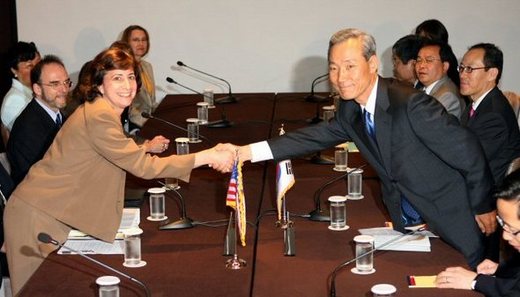 |
|
Korea's top negotiator Kim Jong-hoon and the top U.S. delegate Wendy Cutler shake hands at the beginning of a meeting in Seoul on July 10.
|
U.S. probes each individual market while S.K. prefers to ’bundle’ its offers
The second round of negotiations on a free trade agreement (FTA) between Korea and the United States began July 10 in Seoul, with the U.S. maintaining it would not accept Korean demands that products produced at the Gaeseong (Kaesong) industrial park in North Korea be recognized as made in the Republic of Korea. U.S. negotiators also maintained their stance that rice would be included in future market openings, against the wishes of worried South Korean farmers and workers in that industry. During an interview at the Shilla Hotel in Seoul, where this latest round of negotiations is taking place, chief U.S. negotiator Wendy Cutler said that she expects each side to exchange offers right up until the third round of negotiations, which are scheduled for September. In this way, both sides would clearly determine the direction of the proposals, such as details on phases of tariff removal, before formal offers are exchanged. However, this negotiating tactic runs counter to Korea’s desired strategy of exchanging proposals on sensitive areas lumped together within larger offers, and then later exchanging further offers as the negotiations progress. Korea has several markets it is not eager to open, including rice, so its bargaining power would be weakened if the number of concessions are determined before the "true" negotiations begin.On July 7, top Korean negotiator to the FTA talks Kim Jong-hoon said that even if the basic principles of each side’s proposals cannot be determined, South Korea and the U.S. can still exchange offers as each sees fit. Cutler said she understands that rice is a very sensitive subject in Korea, but maintained that her team would continue to work for market accessibility for American rice. She also demanded the removal of the current 8 percent automobile tariff and changes in the automobile tax, which is currently based on engine displacement size. She expressed concern about Korea’s current system for determining pharmaceutical prices and, in reference to Gaesong, said that an FTA between Korea and the U.S. covers only products made in each of those countries. All are controversial issues in South Korea. Culter said the U.S. has "no interest" in entering Korea’s mainstream education market. Instead, Cutler said, it is interested in providing education services via the internet as well as services relating to the main U.S. college entrance exam, the Scholastic Aptitude Test (SAT). If Korea opens its education market, American schools will be able to offer long-distance educational services without having to establish campuses in Korea.






